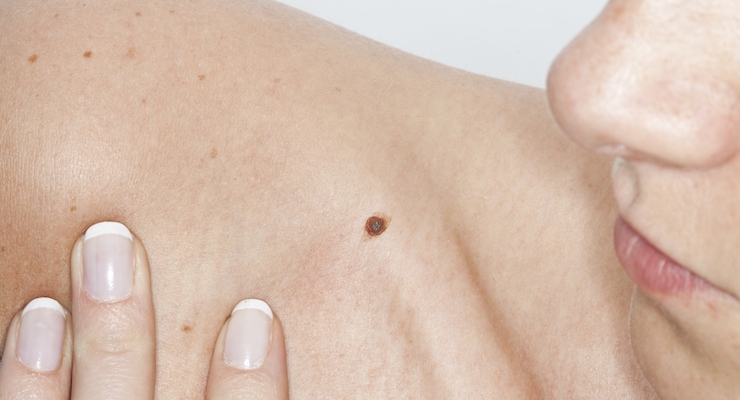
We aren’t born with moles however most people start to see them appear in childhood and early teenage years. By the age of 15, the average Australian child will have more than 50 moles on their body.
Unfortunately, the more moles you have, the greater your chance of getting cancer. But if found early enough they can be treated successfully. For this reason, it’s important to be vigilant about any changes to moles and spots on your skin.
Moles should be observed carefully for any signs of change. Most moles on your skin will look similar so look for any moles that stand out as different to the others. If you do identify any changes, it doesn’t necessarily mean you have cancer, just that you need to follow it up with a visit to your GP. Along with moles, pay attention to birthmarks, beauty marks and any brown spots that may have changed. If a new mole appears after the age of 25, ask your GP to have a look at it.
Here are some things to look out for when checking your skin:
- New moles
- Moles that have increased in size
- The outline of a mole has become etched
- A change in colour from brown to black or varied in colour
- Raised spot or one with a lump within it
- A surface that becomes rough, scaly or ulcerated
- Moles that itch or tingle
- A mole that weeps or bleeds
Types of Skin Cancers
There are three main types of skin cancer:
- Melanoma
- Basal Cell Carcinoma
- Squamous Cell Carcinoma
Melanoma is the least common but most dangerous. It can start in an existing or new mole or spot and change over months. If left unnoticed and not treated in the early days, the cancer can move to internal organs and can cause death. Even moles that are not exposed to the sun can still become cancerous.
The Basal Cell Carcinoma and Squamous Cell Carcinoma are more common than melanoma. They are slow growing cancers but should still be treated early to ensure they don’t spread and reduce the damage they can cause.
Regular Professional Scans
Speak to you GP about how regularly you should have your skin checked by a professional. A skin specialist may take images of your moles and spots so that early changes can be detected at subsequent appointments.
Self-Checks
Monthly self-checks will allow you to notice changes in your skin and pick up any cancerous or pre-cancerous spots. Skin cancers identified and treated early are easy to cure. Skin cancers that are picked up later may require surgery and further cancer treatments. Follow these steps to complete a thorough skin self-check:
1. Look in the mirror and check all of your face and neck, paying close attention to nose, lips, mouth and ears
2. Check your scalp using a hair dryer and a hand mirror to inspect under your hair
3. Check backs of hands and palms including between fingers and under your nails
4. Undress completely and stand in front of a full-length mirror
5. Check arms including elbows and underarms in mirror
6. Next check chest and torso
7. Turn your back to the full-length mirror and use a hand-held mirror to look over the length of your body
8. Sit down to check the front and sides of each leg from thigh to shin then feet, including your soles, between toes and under toenails.
Remember to see your GP if any of your spots are suspicious looking or you aren’t sure of anything.
HIF Healthy Lifestyle Benefits - Skin Cancer Screenings
At HIF we believe skin cancer screenings should be included in your policy. So if you take out Saver Options, Special Options, Super Options or Premium Options Extra Cover, you’ll be able to claim a benefit towards a skin cancer screening under our healthy lifestyle benefits
Please note:
- You must visit a HIF-recognised provider in order to receive a benefit
- Benefits are not available where the service is eligible for a Medicare rebate
- A two month waiting period applies